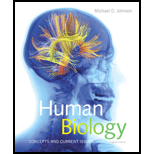
Concept explainers
To review:
The term universal donor, the reason for calling O-negative blood as a universal donor. Also, the reason for considering universal donor as an outdated term.
Introduction:
Based on the protein present in the red blood cell (RBC) surface, the human blood is grouped into four types. These are A, B, AB, and O. Group A blood contains antigen A and antibody B, B blood groups have antigen B and antibody A. AB blood groups carry both antigen A and B and no antibody. The O blood group contains both antibody A and B and no antigen. Along with this, another type of protein is situated on the RBC surface, whose presence or absence determines the positive blood group or negative blood group, respectively.
Trending nowThis is a popular solution!

Chapter 7 Solutions
Human Biology: Concepts and Current Issues (8th Edition)
- Could a person with type O- blood safely receive a blood transfusion of AB- blood?arrow_forwardExplain the rules of transfusion. Illustrate what will happen if typeA blood is accidentally transfused into a type B personarrow_forwardWhy is an individual with type AB blood called a universal recipient?arrow_forward
- What blood types is referred to as a “universal donor?” Why? What blood type is referred to as a “universal recipient?” Why?arrow_forwardlist all of the blood types to which the following people could donate assuming the recipients have been exposed to Rh antigens: Donor 1 :type A Donor 2:type O+ Donor3:type AB+ Donor 4: type B-arrow_forwardAB negative blood can be and can not be donated to which blood groups? Explain with reason.arrow_forward
- Explain the difference between the four primary blood types that are described by the ABO system. Be sure to address why these differences lead to the incompatibilities observed when it comes to blood donations and transfusions.arrow_forwardWhy can an individual with type A blood receive only blood types A and O, but he or she can donate to individuals with either type A or AB blood?arrow_forwardMs. Wu, whose blood type is O-, requires a blood transfusion.Her family members volunteer to donate blood. Their blood types are as follows: her son, type B-; her husband, type B+; her daughter, type O+. Which family members could safely donate blood to Ms. Wu? Who could not? Explain.arrow_forward
- Before a recipient is given blood transfusion, the medical team must first learn the patient's blood type and then find a suitable , or "matching", donor. This is necessary because of the A, B, and Rh antigens on the surface of the donor erythrocytes and the presence of preformed antibodies in the recipient's blood. True or False?arrow_forwardAn individual with Type B+ blood requires a blood transfusion. Which specific blood types can this individual receive? (Select all that apply.) Туре В- Туре АВ- Туре В+ Туре О- Туре О+ Турe АB+arrow_forwardWhich blood type would be a universal donor?arrow_forward
 Human Physiology: From Cells to Systems (MindTap ...BiologyISBN:9781285866932Author:Lauralee SherwoodPublisher:Cengage Learning
Human Physiology: From Cells to Systems (MindTap ...BiologyISBN:9781285866932Author:Lauralee SherwoodPublisher:Cengage Learning
